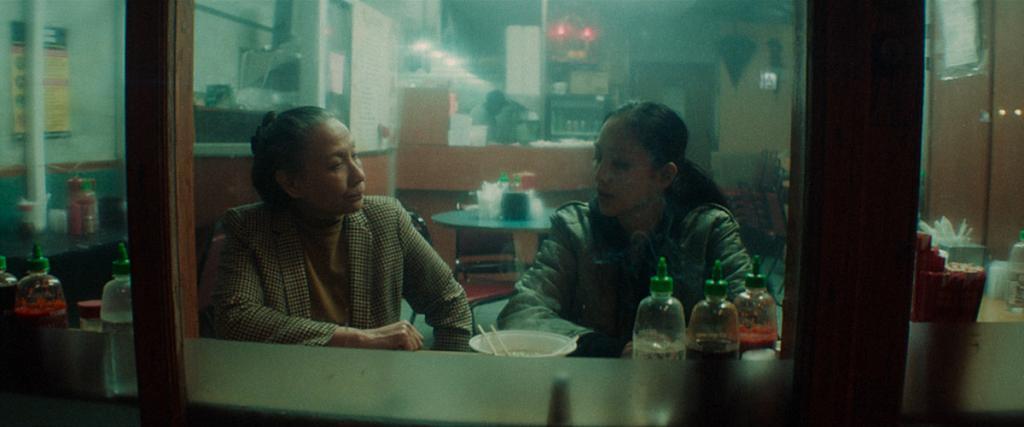
For Sister Tse (Shuya Chang), it seemed as if life couldn’t get more wary. Once the daughter of a prostitute, Tse herself is the latest generational recipient of suffering in her diaspora as an illegal Chinese immigrant, now fully adept to the dangers of the world around her, and with only one clear goal moving forward: Survive.
Such is the culminating characteristic for so many in Tse’s shoes, as observed in Snakehead, writer/director Evan Jackson Leong’s feature directorial debut. Reportedly based on a true story, Snakehead explores Tse’s life, past and present, after landing squarely in New York City where Tse fights tooth and nail for her dignity, climbing the ladder from the abusive clutches of her pimp, Suhyun (Perry Yung), to drawing the curiosity of Chinatown’s most “respected” figure and her very snakehead, Dai Mah (Jade Wu).
For Tse, just short of illegal sex work, her resilient attitude draws the ire of Mah’s rebellious and incorrigible son, Rambo (Sung Kang), while also earning Tse an opportunity to share space working in Mah’s restaurant kitchen under her stewardship alongside newfound friend, Zareeb (Yacine Djoumbaye). It proves to be a worthwhile step up for Tse as well, while always keeping her eye on the ball, and working to pay Mah off for good. What Mah doesn’t know is that Tse is also in search of the long-lost daughter she lost track of more than eight years earlier, who has since been adopted and raised with no real knowledge as to who and/or where her mother is.
Each job Tse works continues to bring in a steady payload for Mah, whose trust grows just a little more for her latest prospect, enough to ante up and start filling in shoes for Mah’s “family business” and helping traffic-in more illegals. For Tse, it’s a mark of personal success that really sort of begins to weigh heavily on her in terms of risk and means, and it’s only a matter of time until a gruesome discovery will force Tse to make the latest-biggest and most important choice of her life, one that could endanger any chance Tse has of reuniting with her daughter and keeping her safe, unless she acts fast.
Close to ten years in the making and crowdfunded for a final lap of post-production several years ago, it’s a sheer wonder that Leong’s breakout crime drama arrives at such a potent time in American history – one in which Asian Americans have placed themselves firmly with a vested interest in the nation’s progressive steerage toward equality and fairness, specifically following a year of violent and heinous attacks fueled by the Trump presidency amid the onset of the 2020 pandemic.
With Asian American history setting a precedent these days, cinema privacy continues to be a useful medium in that regard, with Snakehead offering yet one of many story angles of the lived experiences of non-White residents struggling to make a living. This incarnation sets things in motion with a character in Sister Tse that doesn’t wax poetic about “the American dream” as with a lot of other similar characters Western audiences are used to seeing on screen.
Indeed, lived experiences and the reasons and purposes for each of our trajectories tend to vary, and for Tse, hers is all about “family”, something which Leong stipulates as a developmental plot point in setting the stage between Tse and Mah throughout the film. Tse’s loyalty is never questioned by Mah, but always expected as long as Tse plays the part, which is just a little more than can be said for Rambo, who appears to be more keen on throwing Tse back in Suhyun’s clutches and throwing away the key.
Leong’s script rolls out with a finely-tweaked handling of performances by our cast. Between all the spoken drama and violent reprisals that occur without, there are some quieter, much more nuanced moments that speak for themselves. That same nuance is also exhibited with further introspect as we observe Tse following her daughter, and getting acquainted from a distance without so much as a greeting. The uncertainty as to whether or not they’ll get to meet feels astounding and truly suspenseful at times, and moreover, therein lies Tse’s own forethought about what it means to protect your family. The end result is a bittersweet, albeit fitting story point for a film intended on spotlighting the humanity of a character who, for all intents and purposes, doesn’t think too long before doing what she has to under pressure.
That the American dream is treated more farcically in the eyes of the immigrant is an imaginably realistic perception, and rightly abdicates our protagonist from any such ideals. For that matter, it’s important that in the case of Snakehead and a character like Tse, this is not an American story. Snakehead is purely a redemption story, unbound by the absurdities of any sententious jingoism, alluding to a simple story of a mother willing to do anything to protect her child regardless of the consequences. It’s a compelling, gripping, brutalizing, and even inspirational story that’s as tame as it needs to be…without holding back too much on the ugliness of one’s lived experience.
Snakehead screened this month for the 20th New York Asian Film Festival, and awaits a U.S. release from Samuel Goldwyn Films and Roadside Attractions
